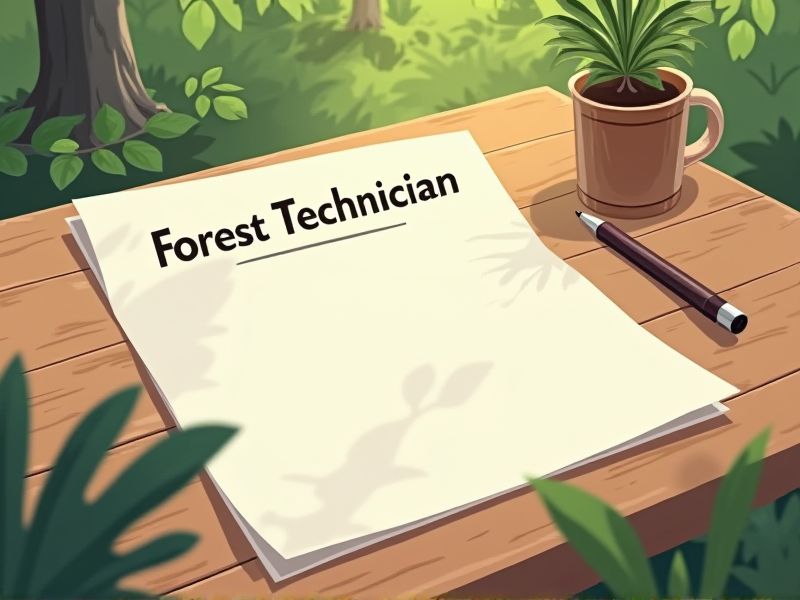
Forest Technicians play a critical role in maintaining and restoring forest ecosystems, which demands precise understanding and application of forestry principles. Certifications are essential as they validate the technician's technical skills and knowledge in areas such as forest inventory, pest management, and fire control. These certifications ensure they can effectively contribute to sustainable forest management and safe operations. Here are some important certifications you may need as a Forest Technician.
Certified Forestry Technician
The role of Certified Forestry Technicians ensures sustainable forest management practices by applying specialized knowledge in forest health and ecology. Their certification verifies their expertise in conducting a wide range of operational activities, including timber harvesting, reforestation, and wildfire management. Certification fosters credibility and trust with stakeholders, facilitating cooperation among organizations, government agencies, and the public. Certified Forestry Technicians contribute to biodiversity conservation by employing data-driven strategies that mitigate environmental impacts.
Certified Forester
A Certified Forester provides specialized expertise that enhances the technical skills of a Forest Technician, resulting in more effective forest management. In regulated forest operations, the guidance of a Certified Forester ensures compliance with environmental laws and sustainable practices. Certified Foresters possess the ability to make data-driven decisions, improving the precision of tasks performed by Forest Technicians. Their knowledge in forest ecology and resource management addresses complex problems that technicians may encounter, leading to improved ecological outcomes.
Geographic Information Systems (GIS) Certification
GIS Certification enhances a forest technician's ability to manage and analyze spatial data critical for forest management. Proficiency in GIS tools leads to improved decision-making regarding land use planning, conservation efforts, and resource allocation. Certification validates a technician's skills, making them more competitive in the job market where digital mapping and spatial analysis are increasingly vital. Forest technicians equipped with GIS knowledge are better prepared to support sustainable forest management practices, which rely heavily on accurate geographic information.
Forest Stewardship Council (FSC) Certification
FSC Certification provides Forest Technicians with a recognized standard that ensures sustainable forest management practices are being followed, which is crucial for environmental conservation. Without this certification, there may be an increased risk of deforestation and biodiversity loss due to unregulated logging activities. Having FSC Certification can enhance the credibility and employability of Forest Technicians, as it demonstrates their commitment to responsible forestry. The certification also fosters better market access for forest products, as many companies and consumers prefer materials sourced from sustainably managed forests.
International Society of Arboriculture (ISA) Certified Arborist
The need for an ISA Certified Arborist for a Forest Technician arises from the certification's assurance of expert knowledge in arboriculture, ensuring the reliable identification and management of tree risks. Proper tree health assessment and tree care techniques provided by certified arborists are crucial for forest sustainability and biodiversity support. Certified Arborists adhere to industry standards and best practices, promoting ecological balance and safety in forest environments. Their expertise assists in ensuring compliance with environmental regulations, ultimately supporting responsible forestry management and conservation efforts.
Wildland Firefighting Certification (S-130/S-190)
Wildland Firefighting Certification (S-130/S-190) equips forest technicians with essential skills to safely manage and suppress wildland fires, reducing potential damage to ecosystems. The training enhances understanding of fire behavior and safety protocols, which is critical in high-risk environments. Forest technicians gain the ability to operate firefighting tools and equipment effectively, ensuring a coordinated response during an incident. Certified technicians become valuable assets in fire-prone areas, contributing to overall forest management and conservation goals.
Pesticide Applicator License (for forest management)
Pesticide applicator licenses are essential for forest technicians to ensure proper and safe use of chemicals, minimizing harm to ecosystems and non-target species. Licensing creates accountability, promoting adherence to guidelines and reducing risks of contamination. Proper certification helps in maintaining forest health by effectively managing invasive species and pests that threaten biodiversity. Technicians with licensure are more equipped to execute integrated pest management strategies, optimizing forest conservation efforts.
Wilderness First Aid/Responder Certification
Wilderness First Aid/Responder Certification equips forest technicians with critical skills to manage medical emergencies in remote areas, improving safety outcomes. Forest environments present unique hazards such as wildlife encounters and severe weather conditions, requiring specialized emergency response knowledge that this certification provides. Having certified responders reduces the time and resources needed for external emergency services, streamlining operations in isolated locations. Employers value this certification as it demonstrates a technician's ability to maintain safety and efficiently handle health crises in forestry settings.
Invasive Species Management Certification
Invasive species can significantly alter forest ecosystems, threatening native biodiversity and ecosystem services. Forest technicians equipped with invasive species management certification gain the skills necessary to identify and mitigate these threats effectively. Certified technicians can implement integrated strategies that combine mechanical, chemical, and biological control methods. This certification ensures standardization in management practices, enhancing the overall health and resilience of forest ecosystems.
Wildlife Habitat Management Certification
Forest Technicians play a crucial role in maintaining ecosystem balance, and Wildlife Habitat Management Certification ensures they have the specialized knowledge to manage and conserve habitats effectively. The certification provides them with insights into the ecological needs of diverse species, which enhances their ability to implement conservation strategies. This knowledge is essential for maintaining biodiversity and ensuring sustainable use of forest resources. Certification can also boost career opportunities as it signifies professionalism and commitment to sustainable forestry practices.
Summary
By acquiring certifications, you can enhance your skills and marketability in the competitive forestry industry. Certified forest technicians often gain access to advanced career opportunities and higher earning potential. This upskilling demonstrates a commitment to best practices and environmental stewardship. In turn, organizations may benefit from employing certified professionals, as this can lead to improved forest management outcomes.
